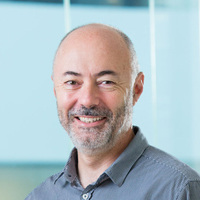Inter and Intra-tumour heterogeneity in metastatic colorectal cancer
-
Group Leader, acting Head of Department

Associate Professor Fred Hollandefrederic.hollande@unimelb.edu.au
03 8559 7023
Project Details
A large number of cancer patients develop metastases and their survival rates are unfortunately very poor, because metastatic tumours respond poorly or start growing back after treatment has stopped. Establishment of resistance and recurrence of initially treatment-responsive tumours are likely to involve the resistance of genetically unique clones, plasticity of tumour cells and self-renewal mechanisms driven by cancer stem cell populations. Our current knowledge is insufficient to recognise when these mechanisms co-exist or when individual tumours preferentially use one of these pathways to survive and evade treatment. In particular, our understanding of cell heterogeneity within metastases remains poor, despite the fact that these represent the actual target of medical treatment once primary tumours are surgically resected. Consequently, patients are often treated with compounds that target some, but not all of the different metastatic cells, which results in subsequent disease recurrence after treatment.
Using metastatic tumour samples, tumour-derived organoids and a combination of optical and genetic barcoding techniques, this project aims to analyse the development of tumour heterogeneity during the metastatic progression of colorectal cancer, to analyse how the heterogeneity of liver metastases is reshaped by treatment with anti-cancer compounds, and to accurately characterise the molecular mechanisms that drive the resistant phenotype of small cell subsets within metastatic tumours. Outcomes from this project will significantly improve our understanding of metastatic heterogeneity and will inform clinical treatment decisions by understanding the mechanisms that underlie post-treatment relapse.
Researchers
- Associate Professor Frederic Hollande, Group Leader, acting Deputy Head of Department
- Dr Yuan Cao, Post-doctoral Research Fellow
- Dr Momeneh Foroutan, Post-doctoral Research Fellow
- Dr Corina Behrenbruch (MBBS), PhD Student
- Ms Carolyn Shembrey, PhD student
- Mr Ben Cooper, PhD student
- Ms Simone Alexander, Master’s Student
Past members of the lab:
- Christina Mølck
- Sophie Paquet-Fifield
- Alexandre Bouyssou
- Laura Marie Beyit
Collaborators
National
Professor Sandy Heriot, Dr Ben Thomson, A/Prof Michael Michael, Peter MacCallum Cancer Centre
Professor Rob Ramsay, Peter MacCallum Cancer Centre
Dr Davide Ferrari, Ms PuXue Qiao, School of Mathematics and Statistics, University of Melbourne
Professor Sean Grimmond, Associate Professor Oliver Hofmann, University of Melbourne
Dr Ann-Marie Patch, QIMR, Brisbane
Dr Melissa Davis, WEHI
Professor Gavin Reid, Bio21, Melbourne
Associate Professor Jon Mangum, University of Melbourne
Dr Delphine Merino, Olivia Newton John Cancer Research Centre, Melbourne
International
Professor Alain Puisieux, Cancer Research Centre, Lyon, France
Funding
- Colorectal Surgical Society of Australia and New Zealand (CSSANZ) Foundation “Genomic analysis of Metastatic Colorectal Cancer” (2018)
- National Health and Medical Research Institute (INSERM), France, and The University of Melbourne partnership program (2018-2021).
- Colorectal Surgical Society of Australia and New Zealand (CSSANZ) “Personalising Treatment in Patient with Metastatic Colorectal Cancer” (2016)
- The University of Melbourne Department of Pathology (2012-2015)
Research Outcomes
Qiao P, et al. A Spatio-Temporal Model and Inference Tools for Longitudinal Count Data on Multicolor Cell Growth. Int J Biostat. 2018 Jul 7. pii: /j/ijb.ahead-of-print/ijb-2018-0008/ijb-2018-0008.xml. doi:10.1515/ijb-2018-0008.
Behrenbruch C, et al., Surgical stress response and promotion of metastasis in colorectal cancer: a complex and heterogeneous process. Clin Exp Metastasis. 2018 Apr;35(4):333-345. doi: 10.1007/s10585-018-9873-2.
Morel AP, et al., A stemness-related ZEB1-MSRB3 axis governs cellular pliancy and breast cancer genome stability. Nat Med. 2017 May;23(5):568-578. doi: 10.1038/nm.4323.
Brown DV, et al., Expression of CD133 and CD44 in glioblastoma stem cells correlates with cell proliferation, phenotype stability and intra-tumor heterogeneity. PLoS One. 2017 Feb 27;12(2):e0172791. doi: 10.1371/journal.pone.0172791.
Grillet F, et al., Circulating tumour cells from patients with colorectal cancer have cancer stem cell hallmarks in ex vivo culture. Gut. 2017 Oct;66(10):1802-1810. doi: 10.1136/gutjnl-2016-311447.
Qian G, et al., Semisupervised Clustering by Iterative Partition and Regression with Neuroscience Applications. Comput Intell Neurosci. 2016;2016:4037380. doi: 10.1155/2016/4037380.
Bonnans C, Flacelière M, Grillet F, Dantec C, Desvignes JP, Pannequin J, Severac D, Dubois E, Bibeau F, Escriou V, Crespy P, Journot L, Hollande F* and Joubert D*. Essential requirement for β-arrestin2 in mouse intestinal tumors with elevated Wnt signaling. (*Joint supervising authors). Proc Natl Acad Sci USA 2012 Feb 21;109(8): 3047-52.
Hollande F., Pannequin J., and Joubert D. (2010) The long road to colorectal cancer therapy: searching for the right signals. Drug Resistance Updates 2010 Feb-Apr;13(1-2): 44-56.
Buchert M, Papin M, Bonnans C, Darido C, Raye WS, Garambois V, Pélegrin A, Bourgaux JF, Pannequin J, Joubert D, and Hollande F. (2010) Symplekin promotes tumorigenicity by upregulating claudin-2 expression. Proc. Nat. Acad Sci USA, 2010 Feb 9;107(6): 2628-33.
Research Group
Hollande laboratory: Tumour Heterogeneity in Metastatic Cancer
Faculty Research Themes
School Research Themes
Key Contact
For further information about this research, please contact the research group leader.
Department / Centre
MDHS Research library
Explore by researcher, school, project or topic.